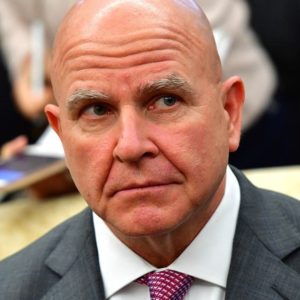War Studies Program
Learn the theory, practice, organization, and control of war and military forces.
Mondays | June 6, 13, 20, 27
Online Summer Courses
The 2018 National Defense Strategy was the first time the Pentagon identified China as the organizing focus of U.S. defense policy. Elbridge Colby, former Deputy Assistant Secretary of Defense for Strategy and Force Development, was a key architect of that document.
In this seminar, based on Colby’s new book, The Strategy of Denial, fellows will explore how America’s defense strategy must change to counter China’s growing power and ambition.
Image Credit: Staff Sgt. D. Myles Cullen (USAF), March 22, 2007
Elbridge Colby on the Sources of Chinese Conduct
This course takes place on Zoom over four sessions, held on Mondays, from 5 to 7 PM ET. Fellows will receive a $400 stipend contingent upon participation in the course and completion of a brief response paper. All course materials will be provided.

Elbridge Colby is co-founder and principal of The Marathon Initiative, a policy initiative focused on developing strategies to prepare the United States for an era of sustained great power competition. He is the author of The Strategy of Denial: American Defense in an Age of Great Power Conflict (Yale University Press, 2021). Previously, Colby was from 2018-2019 the Director of the Defense Program at the Center for a New American Security, where he led the Center’s work on defense issues.

Elbridge Colby is co-founder and principal of The Marathon Initiative, a policy initiative focused on developing strategies to prepare the United States for an era of sustained great power competition. He is the author of The Strategy of Denial: American Defense in an Age of Great Power Conflict (Yale University Press, 2021).
Previously, Colby was from 2018-2019 the Director of the Defense Program at the Center for a New American Security, where he led the Center’s work on defense issues. Before that, he served as the Deputy Assistant Secretary of Defense for Strategy and Force Development from 2017-2018. In that role, he served as the lead official in the development and rollout of the Department’s preeminent strategic planning guidance, the 2018 National Defense Strategy (NDS).
Colby was from 2014 to 2017 the Robert M. Gates Senior Fellow at the Center for a New American Security. From 2010 to 2013 he was principal analyst and division lead for global strategic affairs at CNA. Earlier in his career he served for over five years in the U.S. Government working on a range of strategic forces, arms control, WMD, and intelligence reform matters, including service with the Coalition Provisional Authority in Iraq in 2003 and with the Office of the Director of National Intelligence during its stand-up in 2005-2006. Colby has also served on the staff of a number of government commissions, including the 2014 National Defense Panel, the 2008-2009 Strategic Posture Commission, and the 2004-2005 President’s WMD Commission.
Colby’s work has appeared in outlets such as Foreign Affairs, The Wall Street Journal, The Washington Post, The New York Times, Foreign Policy, and The National Interest as well as in international outlets such as Asahi Shimbun, Yomiuri Shimbun, Nikkei Asia, Frankfurter Allgemeine Zeitung, Le Figaro, Survival, Internationale Politik, Die Zeit, The Taipei Times, Hankook Ilbo, Limes, The New Straits Times, and The Manila Standard. He is also the author of many book chapters, reports, and articles on defense and foreign policy issues. He has testified a number of times before Congress and the U.S.-China Economic and Security Review Commission. Colby is a recipient of the Distinguished and Exceptional Public Service Awards from the Department of Defense and of the Superior and Meritorious Honor Awards from the Department of State. A member of the Council on Foreign Relations and the International Institute of Strategic Studies, Colby is a graduate of Harvard College and Yale Law School.
Readings:
Discussion Questions:
Readings:
Discussion Questions:
Readings:
Discussion Questions:
Readings:
Discussion Questions:
Matt Turpin
Matthew Turpin is a visiting fellow at the Hoover Institution, where he specializes in U.S. policy toward the People’s Republic of China, economic statecraft, and technology innovation. He is also a senior advisor at Palantir Technologies.

Daniel Blumenthal
Dan Blumenthal is a senior fellow at the American Enterprise Institute, where he focuses on East Asian security issues and Sino-American relations. Mr. Blumenthal has served in and advised the US government on China issues for more than a decade.

Christian Brose
Christian Brose is a Senior Fellow at the Carnegie Endowment for International Peace and the Head of Strategy at Anduril Industries, prior to which he served as staff director of the Senate Armed Services Committee. He was also responsible for leading the production, negotiation, and passage of four National Defense Authorization Acts, which set policy and authorized spending for all U.S. national defense activities.

Matthew Kroenig
Matthew Kroenig is a Professor in the Department of Government and the Edmund A. Walsh School of Foreign Service at Georgetown University. A 2019 study in Perspectives on Politics ranked him as one of the top 25 most-cited political scientists of his generation. He has served in several positions in the U.S. Department of Defense and the intelligence community in the Bush and Obama administrations.

H.R. McMaster
H. R. McMaster is the Fouad and Michelle Ajami Senior Fellow at the Hoover Institution, Stanford University. Previously, he served as the 26th assistant to the president for National Security Affairs and as a commissioned officer in the United States Army for 34 years before retiring as a Lieutenant General. He is author of Battlegrounds: The Fight to Defend the Free World.

Vance Serchuk
Vance Serchuk is Executive Director of the KKR Global Institute and an Adjunct Senior Fellow at the Center for a New American Security. Prior to joining KKR, Mr. Serchuk served for six years as the senior national security advisor to Senator Joseph Lieberman (I-Connecticut).

Robert Kagan
Robert Kagan is a senior fellow with the Project on International Order and Strategy in the Foreign Policy program at the Brookings Institution. He is a contributing columnist at The Washington Post. His most recent book is The New York Times bestseller, The World America Made.